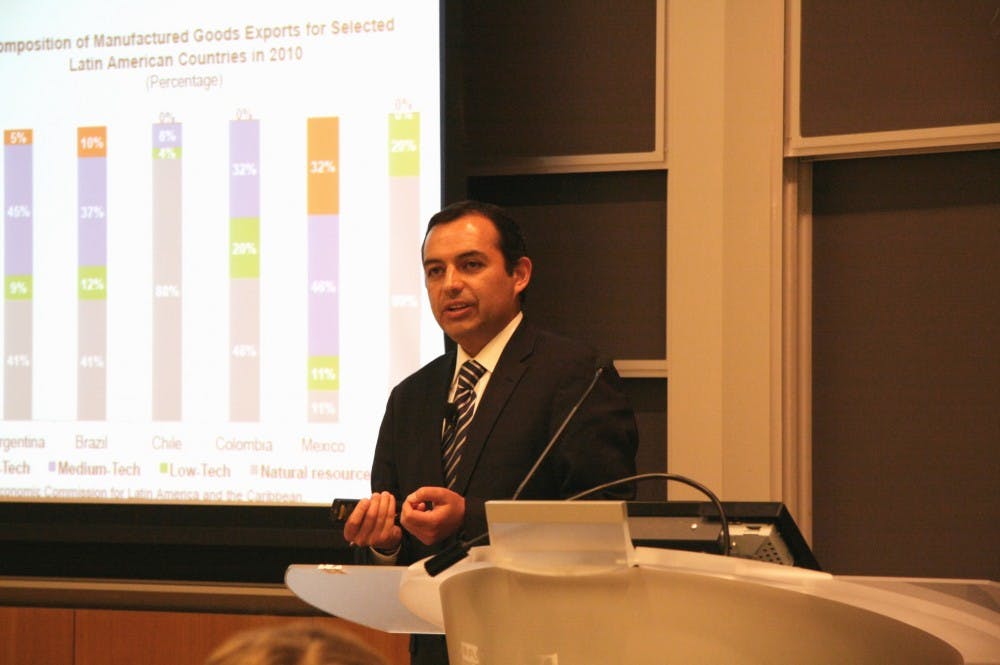President of the Mexican Senate Ernesto Cordero Arroyo gave a talk Monday night about the state of the Mexican economy. Cordero, who received his master’s degree in economics from Penn in 1998, is also Mexico’s former secretary of finance. The talk, held at Huntsman Hall, was part of the annual Reinsberg Lecture sponsored by the Huntsman Program in International Studies and Business.
Mexico’s Bad Rap
Cordero opened his talk by expelling myths about Mexico’s ailing economy. “Mexico is … an example of a country destroyed by international media,” he said. “You have read a lot that Mexico has very disappointing economic progress. That is not necessarily true. It has been able to grow at four and five percent [in annual Gross Domestic Product].”
Mexico experienced rampant inflation in the 1980s and 1990s, culminating in the Tequila crisis in December 1994, but has since enacted policies to curb inflation and establish open trade with other countries.
“When Mexico is in the expansion phase, its GDP grows faster than the United States,” Cordero said. “The Mexican economy is strong, has high potential and is stable.”
On the Current Administration
“I was the secretary of finance in the previous administration. It is not elegant to say things about the new administration, but there is a learning curve here,” Cordero said. He was secretary of finance for Mexico from 2009 through 2011.
Since the enactment of the current administration’s policies, there has been a decline in the annual growth of Mexico’s GDP. The current secretary of finance, Luis Videgaray Caso , earned his doctorate in economics from the Massachusetts Institute of Technology.
“I think Penn is definitely a better option than MIT to learn economic policy,” Cordero said.
Mexico is an Exporter
“Mexico is a very strong exporter, but basically what we export are manufactures — our economy relies heavily on manufactures,” Cordero said. “It makes up 81 percent of the GDP. No Latin American country is even close.”
Cordero explained that because Mexico does not export commodities, but intermediate goods, Mexico appears worse off than other Latin American countries. “We do not design planes — we build all the parts to make a plane fly,” he said.
Human Development
According to the Human Development Index, which measures the welfare of a country, Mexico ranks above Brazil, China, South Africa and India. The index, published by the United Nations, uses a country’s life expectancy, educational attainment and income level as metrics.
“Mexico is facing social challenges, but is not a poor country,” Cordero said.
He equated Mexico’s living conditions to Russia’s, which have surpassed those of an “emerging” nation. Mexico’s HDI measured 0.775 in 2012, close to Russia’s HDI of 0.778.
“People believe that half of Mexico is in poverty,” Cordero added. However, according to the World Bank, Mexico’s 2012 poverty level was five percent in 2012, compared to 15 percent in 1992. The World Bank defines “extreme poverty” as equivalent to living on less than $2 per day.
Future Outlook
Mexico is investing in labor, technology and infrastructure with the hopes of continuing to grow the Mexican economy. “I am very optimistic of the reforms of my country. Without reforms, the economy would be seeing two to three percent growth per year. However, with the reforms, we are seeing five percent growth per year,” Cordero said.
“[But] if you want to invest in a country, you have to look at the clouds in the horizon,” he added.
Economic Impact of Undocumented Migrants to the United States
Cordero explained that the migration from Mexico to the United States is beneficial in some ways to the Mexican economy. “It has a positive effect, because some of the income of the migrants goes back to Mexico,” Cordero said. “That means some dollars go back to the Mexican economy, helping to support Mexican families. I think it alleviates a lot of social pressure,” he said.
The World Bank estimated that remittance, the term for Mexican immigrants sending money home to relatives, comprised two percent of Mexico’s 2012 GDP.
Cordero added that Mexico should be working to create jobs that will retain their most productive citizens. “In terms of long-term human capital accumulation, I think that Mexico does not benefit at all [from the migration],” he said. “If you see the people that cross the border, they are very brave to cross without knowing the language. Most of them are able to survive and generate an income. That is the human capital you need in a country like Mexico.”



